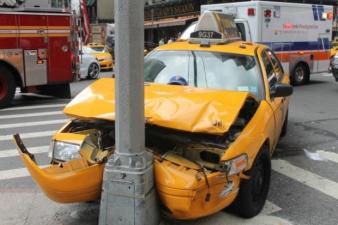What to Watch for at Tomorrow’s Council Hearing on Greenfield’s 20 MPH Bill
Tomorrow, the City Council transportation committee is holding a hearing on a bill sponsored by Council Member David Greenfield that would lower the speed limit on most residential streets to 20 mph. The bill has been welcomed by advocates, but there are some legal questions to keep an eye on during testimony tomorrow morning.

Currently, the citywide speed limit of 30 mph is set by the city’s administrative code but allows DOT to install signs that are exceptions to this rule. Greenfield’s bill would add a new section to that law stating that “speed limits not exceeding twenty miles per hour shall be established on all streets fewer than sixty feet wide in areas zoned for residential purposes.”
Debate over the 60-foot width cutoff and the definition of “zoned for residential purposes” will be items to watch during tomorrow’s hearing. Transportation Alternatives general counsel Juan Martinez also cautioned that a state law complicates the 20 mph proposal.
That law, which applies only to New York City (with the exception of school zones), says that any street with a speed limit below 25 mph must include traffic calming devices other than signage. This helps explain, for example, why DOT’s Slow Zone program includes a mixture of traffic calming devices in addition to 20 mph speed limits.
What’s less clear is what qualifies as traffic calming. “Traffic calming could be paint,” Martinez said. “We’re not allowed by state law to just change the speed limit signs and leave it at that. We have to do some traffic calming measures.”
I asked Greenfield about this hurdle and whether he would seek to amend the law by, for example, setting a 25 mph citywide speed limit instead. “I’m sure there are other ways to do it,” he said, adding that he wanted to craft a bill that would get broad support. “I think it makes more sense to the average New Yorker that a side street where kids play should have a lower speed limit,” he said.
Greenfield and Martinez agreed that lower speed limits are one component of what’s needed to fight speeding. “I’ve been very outspoken about the lack of speeding enforcement by the NYPD,” Greenfield said. “It’s part of the package. I don’t think there’s any one solution.”
“It’s not something that’s going to happen overnight; it’s going to take a lot of work and a lot of study,” Martinez said of 20 mph speed limits, which he noted would cover large sections of the city under Greenfield’s bill. “When you talk about pedestrians and protecting folks near their homes, this is going to make a big difference.”
DOT refused comment on the bill in advance of tomorrow’s hearing.
